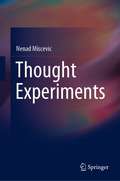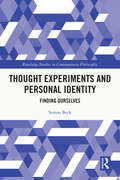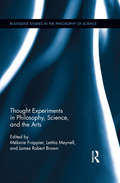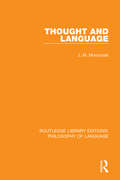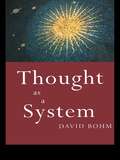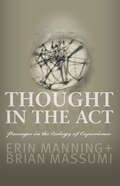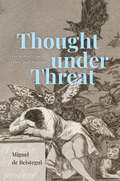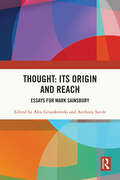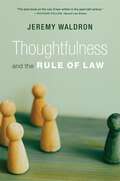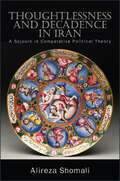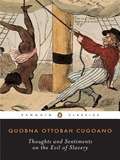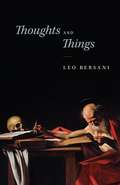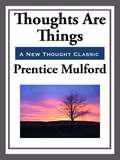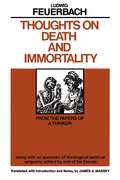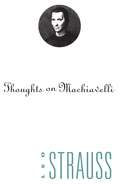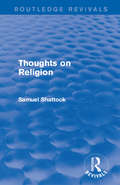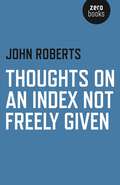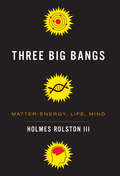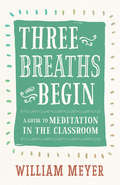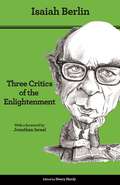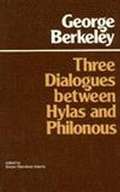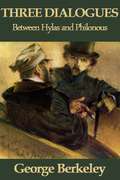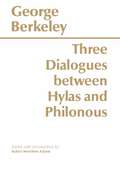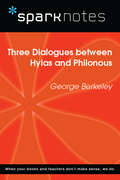- Table View
- List View
Thought Experiments
by Nenad MiscevicThis book offers a readable introduction to the main aspects of thought experimenting in philosophy and science (together with related imaginative activities in mathematics and linguistics). It presents the main options in understanding thought experiments, from empiricism to Platonism, and discusses their strengths and weaknesses. However, it also provides some original perspectives on the topic. Firstly, it provides a new definition and analysis of thought experimenting that brings it closer to laboratory experimenting. Secondly, it develops the author’s earlier theory of “mental modelling”, proposed some decades ago by him, and some other researchers in the field as the crucial procedure in thought experimenting. The mental modelling approach links work with thought experimenting to cognitive science and to research on mental simulation which is a hot topic in present-day research. Thirdly, it proposes a principled way to respond to criticism of thought experimenting by “experimental philosophers” as they have been dominating the present-day debates. The response suggests a possible ameliorative, self-help project for thought experimenting. Finally, the book provides a way to systematize the history of important thought experiments in science and philosophy and thus connects, in an original way, the systematic investigation of experimenting to the historical work of famous thought experiments. It is of interest to scholars interested in history of ideas and philosophy of science.
Thought Experiments and Personal Identity: Finding Ourselves (Routledge Studies in Contemporary Philosophy)
by Simon BeckThis book provides an essential, comprehensive discussion on thought experiments and how they have featured throughout the history of the personal identity debate in analytic philosophy.Although many philosophical arguments employ thought experiments as a valuable methodological tool, there is a lack of focused discussion on the significant role these experiments play in the personal identity debate specifically. This book covers a range of central theories and examines how thought experiments have been featured throughout each. The author discusses and responds to pivotal works on personal identity such as John Locke’s Essay Concerning Human Understanding, Derek Parfit’s Reasons and Persons, as well as more recent arguments in the discussion. The book also explores how thought experiments are used for related debates in other philosophical traditions.Thought Experiments and Personal Identity will be of interest to scholars and advanced students working in contemporary philosophy of mind and metaphysics, as well as those with an interest in philosophical methodology.
Thought Experiments in Science, Philosophy, and the Arts (Routledge Studies in the Philosophy of Science #11)
by James Robert Brown Mélanie Frappier Letitia MeynellFrom Lucretius throwing a spear beyond the boundary of the universe to Einstein racing against a beam of light, thought experiments stand as a fascinating challenge to the necessity of data in the empirical sciences. Are these experiments, conducted uniquely in our imagination, simply rhetorical devices or communication tools or are they an essential part of scientific practice? This volume surveys the current state of the debate and explores new avenues of research into the epistemology of thought experiments.
Thought and Language
by J. M. MoravcsikOriginally published in 1990, this book centres on a certain way of surveying a variety of theories of language, and on outlining a new proposal of meaning within the framework set by the survey. One of the key features of both survey and proposal is the insistence on the need to locate theories of language within a large framework that includes questions about the nature of thought and about general ontological questions as well. The book deals in an interconnected way with both very general and specific issues. At one end of this spectrum there are discussions of the contrast between realist and nominalist ontologies, while at the other are analyses of specific lexical items of English.
Thought as a System (Key Ideas)
by David BohmFirst Published in 1994. Routledge is an imprint of Taylor & Francis, an informa company.
Thought in the Act: Passages in the Ecology of Experience (Thought In The Act Ser.)
by Brian Massumi Erin Manning&“Every practice is a mode of thought, already in the act. To dance: a thinking in movement. To paint: a thinking through color. To perceive in the everyday: a thinking of the world&’s varied ways of affording itself.&” —from Thought in the ActCombining philosophy and aesthetics, Thought in the Act is a unique exploration of creative practice as a form of thinking. Challenging the common opposition between the conceptual and the aesthetic, Erin Manning and Brian Massumi &“think through&” a wide range of creative practices in the process of their making, revealing how thinking and artfulness are intimately, creatively, and inseparably intertwined. They rediscover this intertwining at the heart of everyday perception and investigate its potential for new forms of activism at the crossroads of politics and art.Emerging from active collaborations, the book analyzes the experiential work of the architects and conceptual artists Arakawa and Gins, the improvisational choreographic techniques of William Forsythe, the recent painting practice of Bracha Ettinger, as well as autistic writers&’ self-descriptions of their perceptual world and the experimental event making of the SenseLab collective. Drawing from the idiosyncratic vocabularies of each creative practice, and building on the vocabulary of process philosophy, the book reactivates rather than merely describes the artistic processes it examines. The result is a thinking-with and a writing-in-collaboration-with these processes and a demonstration of how philosophy co-composes with the act in the making. Thought in the Act enacts a collaborative mode of thinking in the act at the intersection of art, philosophy, and politics.
Thought under Threat: On Superstition, Spite, and Stupidity
by Miguel de BeisteguiThought under Threatreveals and combats the forces diminishing the power and role of critical thinking, whether in our individual lives or collectively.Thought under Threat is an attempt to understand the tendencies that threaten thinking from within. These tendencies have always existed. But today they are on the rise and frequently encouraged, even in our democracies. People “disagree” with science and distrust experts. Political leaders appeal to the hearts and guts of “the people,” rather than their critical faculties. Stupidity has become a right, if not a badge of honor; superstition is on the rise; and spite is a major political force. Thinking is considered “elitist.” To see those obstacles as vices of thought, Miguel de Beistegui argues, we need to understand stupidity not as a lack of intelligence or judgment, but as the tendency to raise false problems and trivial questions. Similarly, we need to see spite not as a moral vice, but as a poison that blurs and distorts our critical faculties. Finally, superstition is best described not as a set of false beliefs, but as a system that neutralizes one’s ability to think for oneself. For de Beistegui, thinking is intrinsically democratic and a necessary condition for the exercise of freedom. Thought under Threat shows how a training of thought itself can be used to ward off those vices, lead to productive deliberation, and, ultimately, create a thinking community.
Thought: Essays for Mark Sainsbury
by Anthony Savile Alex GrzankowskiThe work of Mark Sainsbury has made a significant and challenging contribution to several central areas of philosophy, especially philosophy of language and logic. He has made significant contributions to puzzles concerning the nature of thought and language and pioneered research in the philosophical theory known as fictionalism.In this outstanding volume, 20 contributors engage with Sainsbury’s work but also go beyond it, exploring fundamental problems in the philosophy of language, mind, and logic. Topics covered include propositional thought, intentionality, the mind-body problem, singular thoughts, the individuation of concepts, nominalisation, logical form, non-existent objects, and vagueness.Thought: Its Origin and Reach will be of interest to professional philosophers and students working in philosophy of mind, language, epistemology, and metaphysics.
Thoughtfulness and the Rule of Law
by Jeremy WaldronAn essential study of the rule of law by one of the world’s leading liberal political and legal philosophers.The meaning and value of the rule of law have been debated since antiquity. For many, the rule of law has become the essence of good government. But Jeremy Waldron takes a different view, arguing that it is but one star in a constellation of ideals that define our political morality, ranking alongside democracy, human rights, economic freedom, and social justice.This timely essay collection, from one of the most respected political philosophers of his generation, is a brief on behalf of thoughtfulness: the intervention of human intelligence in the application of law. Waldron defends thoughtfulness against the claim that it threatens to replace the rule of law with the arbitrary rule of people. To the contrary, he argues, the rule of law requires thoughtfulness: it is impossible to apply a standard such as “reasonableness” on the basis of rules alone, and common legal activities like arguing in court and reasoning from precedents are poorly served by algorithmic logics. This rich compilation also addresses the place of law in protecting human dignity, the relation between rule of law and legislation, and whether vagueness in the law is at odds with law’s role in guiding action.Thoughtfulness and the Rule of Law emphasizes the value of procedures rather than the substance or outcome of legal decisions. Challenging the view that predictability and clarity are cardinal virtues, Waldron shows that real-world controversies often are best approached using a relatively thin concept of the rule of law, together with the thoughtfulness that a legal system frames and enables.
Thoughtlessness and Decadence in Iran: A Sojourn in Comparative Political Theory
by Alireza ShomaliPolitical decay in Islamic societies has for the most part been the subject of structural analyses while philosophical studies have been rare, often speculative and deterministic. Thoughtlessness and Decadence in Iran explores from a theoretical perspective the problem of democracy deficit—or, political decadence—in contemporary Iran and, by implication, in present-day Middle Eastern societies. This decadence, the book argues, is in part a religion-based decadence, and deliverance from it requires collective thoughtfulness about religion. Alireza Shomali conceptualizes the Iranian Reality in terms of a lack of not only good life but also thinking of good living. This thoughtlessness means dissolution of critical consciousness and, as such, it heralds escalating decadence. At this moment of rapid decay, the book argues, thought must become relevant to society: the communicative practice of thinking must emerge to examine the pathologies of a religiously administrated life. Opening a dialogue between Adorno, Strauss, Farabi and Razi, among others, Shomali underlines the critical points of similarity and difference between these thinkers and envisions a "local" emancipatory project that, noting the specifics of the Iranian case, takes lessons from the Western experience without blind imitation.
Thoughts and Sentiments on the Evil of Slavery
by Quobna Ottobah Cugoano Vincent CarrettaBorn in present-day Ghana, Quobna Ottobah Cugoano was kidnapped at the age of thirteen and sold into slavery by his fellow Africans in 1770; he worked in the brutal plantation chain gangs of the West Indies before being freed in England. His Thoughts and Sentiments on the Evil of Slavery is the most direct criticism of slavery by a writer of African descent. Cugoano refutes pro-slavery arguments of the day, including slavery's supposed divine sanction; the belief that Africans gladly sold their own families into slavery; that Africans were especially suited to its rigors; and that West Indian slaves led better lives than European serfs. Exploiting his dual identity as both an African and a British citizen, Cugoano daringly asserted that all those under slavery's yoke had a moral obligation to rebel, while at the same time he appealed to white England's better self.
Thoughts and Things
by Leo BersaniLeo Bersani's career spans more than fifty years and extends across a wide spectrum of fields--including French studies, modernism, realist fiction, psychoanalytic criticism, film studies, and queer theory. Throughout this new collection of essays that ranges, interestingly and brilliantly, from movies by Claire Denis and Jean-Luc Godard to fiction by Proust and Pierre Bergounioux, Bersani considers various kinds of connectedness. "Thoughts and Things" posits what would appear to be an irreducible gap between our thoughts (the human subject) and things (the world). Bersani departs from his psychoanalytic convictions to speculate on the oneness of being--of our intrinsic connectedness to the other that is at once external and internal to us. He addresses the problem of formulating ways to consider the undivided mind, drawing on various sources, from Descartes to cosmology, Freud, and Genet and succeeds brilliantly in diagramming new forms as well as radical failures of connectedness. Ambitious, original, and eloquent, "Thoughts and Things" will be of interest to scholars in philosophy, film, literature, and beyond.
Thoughts are Things
by Prentice MulfordPrentice Mulford was one of the leaders of the New Thought Movement. Thoughts are Things will help you use the power of your thoughts to improve your life and to bring yourself the peace of mind you've always wished for. Learn how to think in a way that will help you succeed and make you happier in every aspect of your life. This book holds the Secret to the Law of Attraction! The inclusion of Mulford's brilliant essay "The God in You" makes this the definitive edition.
Thoughts on Death and Immortality: From the Papers of a Thinker, along with an Appendix of Theological Satirical Epigrams, Edited by One of his Friends
by Ludwig FeuerbachNever translated before, 'Thoughts on Death and Immortality' was the first published work of Ludwig Feuerbach (1804-1872). The scandal created by portrayal of Christianity as an egoistic and inhumane religion cost the young Hegelian his job and, to some extent, his career. Joining philosophical argument to epigram, lyric, and satire, the work has three central arguments: first, a straightforward denial of the Christian belief in personal immortality; second, a plea for recognition of the inexhaustible quality of the only life we have; and third, a derisive assault on the posturings and hypocrisies of the professional theologians of nineteenth-century Germany.
Thoughts on Machiavelli
by Leo StraussLeo Strauss argued that the most visible fact about Machiavelli's doctrine is also the most useful one: Machiavelli seems to be a teacher of wickedness. Strauss sought to incorporate this idea in his interpretation without permitting it to overwhelm or exhaust his exegesis of The Prince and the Discourses on the First Ten Books of Livy. "We are in sympathy," he writes, "with the simple opinion about Machiavelli [namely, the wickedness of his teaching], not only because it is wholesome, but above all because a failure to take that opinion seriously prevents one from doing justice to what is truly admirable in Machiavelli: the intrepidity of his thought, the grandeur of his vision, and the graceful subtlety of his speech." This critique of the founder of modern political philosophy by this prominent twentieth-century scholar is an essential text for students of both authors.
Thoughts on Man
by William GodwinTHOUGHTS ON MAN HIS NATURE, PRODUCTIONS AND DISCOVERIES INTERSPERSED WITH SOME PARTICULARS RESPECTING THE AUTHOR
Thoughts on Religion (Routledge Revivals)
by Samuel ShattockThis book, first published in 1926, is a collection of the original thoughts of Samuel George Shattock on religious matters. Shattock recorded his thoughts on religion throughout his life. This title brings together what Shattock himself felt to be his most important ideas on theology. Thoughts on Religion will be of interest to students of religion and philosophy.
Thoughts on an Index Not Freely Given
by John RobertsIn this ambitious theoretical encounter with five imaginary artists from the 1980s, John Roberts produces a set of richly constructed artistic thought experiments. But in creating the work on the page these thought experiments are not thereby novelistic fictions. On the contrary, the fictiveness of each artist&’s work and biography is formed from Roberts&’s critical engagement with the historical and theoretical determinates of the work he has created - artwork and its theoretical engagement forming an interdependent whole.
Three Big Bangs: Matter-Energy, Life, Mind
by Holmes Rolston IIIBy dividing the creation of matter, energy, life, and mind into three big bangs, Holmes Rolston III brings into focus a history of the universe that respects both scientific discovery and the potential presence of an underlying intelligence. Matter-energy appears, initially in simpler forms but with a remarkable capacity for generating heavier elements. The size and expansion rate of the universe, the nature of electromagnetism, gravity, and nuclear forces enable the the explosion of life on Earth. DNA discovers, stores, and transfers information generating billions of species. Cognitive capacities escalate, and with neural sentience this results in human genius. A massive singularity, the human mind gives birth to language and culture, increasing the brain's complexity and promoting the spread of ideas. Ideas generate ideals, which lead life to take on spirit. The nature of matter-energy, genes, and their genesis therefore encourages humans to wonder where they are, who they are, and what they should do.
Three Breaths and Begin: A Guide to Meditation in the Classroom
by William MeyerLEARN THE TRANSFORMATIVE POWER OF MEDITATION IN THE CLASSROOM Meditation can be a potent practice for creating focus and facilitating learning in the classroom, for kindergarteners, grad students, and everyone in between. Longtime schoolteacher William Meyer has taught a variety of meditation techniques to students, fellow teachers, and parents with remarkable results. In Three Breaths and Begin, Meyer details how teachers can incorporate mindfulness into their curricula every day. He covers every aspect of teaching meditation, from creating a dedicated space in the classroom to meditating on field trips, in sports settings, and even in the midst of tragedy. Offering numerous ready-to-use scripted meditations, this insightful, practical, and loving guide will benefit anyone interested in the well-being of students — and, most of all, the students themselves.
Three Critics of the Enlightenment: Vico, Hamann, Herder - Second Edition
by Isaiah BerlinIsaiah Berlin was deeply admired during his life, but his full contribution was perhaps underestimated because of his preference for the long essay form. The efforts of Henry Hardy to edit Berlin's work and reintroduce it to a broad, eager readership have gone far to remedy this. Now, Princeton is pleased to return to print, under one cover, Berlin's essays on these celebrated and captivating intellectual portraits: Vico, Hamann, and Herder. These essays on three relatively uncelebrated thinkers are not marginal ruminations, but rather among Berlin's most important studies in the history of ideas. They are integral to his central project: the critical recovery of the ideas of the Counter-Enlightenment and the explanation of its appeal and consequences--both positive and (often) tragic. Giambattista Vico was the anachronistic and impoverished Neapolitan philosopher sometimes credited with founding the human sciences. He opposed Enlightenment methods as cold and fallacious. J. G. Hamann was a pious, cranky dilettante in a peripheral German city. But he was brilliant enough to gain the audience of Kant, Goethe, and Moses Mendelssohn. In Hamann's chaotic and long-ignored writings, Berlin finds the first strong attack on Enlightenment rationalism and a wholly original source of the coming swell of romanticism. Johann Gottfried Herder, the progenitor of populism and European nationalism, rejected universalism and rationalism but championed cultural pluralism. Individually, these fascinating intellectual biographies reveal Berlin's own great intelligence, learning, and generosity, as well as the passionate genius of his subjects. Together, they constitute an arresting interpretation of romanticism's precursors. In Hamann's railings and the more considered writings of Vico and Herder, Berlin finds critics of the Enlightenment worthy of our careful attention. But he identifies much that is misguided in their rejection of universal values, rationalism, and science. With his customary emphasis on the frightening power of ideas, Berlin traces much of the next centuries' irrationalism and suffering to the historicism and particularism they advocated. What Berlin has to say about these long-dead thinkers--in appreciation and dissent--is remarkably timely in a day when Enlightenment beliefs are being challenged not just by academics but by politicians and by powerful nationalist and fundamentalist movements. The study of J. G. Hamann was originally published under the title The Magus of the North: J. G. Hamann and the Origins of Modern Irrationalism. The essays on Vico and Herder were originally published as Vico and Herder: Two Studies in the History of Ideas. Both are out of print. This new edition includes a number of previously uncollected pieces on Vico and Herder, two interesting passages excluded from the first edition of the essay on Hamann, and Berlin's thoughtful responses to two reviewers of that same edition.
Three Dialogues Between Hylas and Philonous
by George Berkeley Robert Merrihew AdamsBerkley, using the medium of dialogue based text, challenges the existence of matter against Ideas in the mind, that are the ultimate reality paving way for knowledge.
Three Dialogues Between Hylas and Philonous
by George BerkeleyFirst published in 1713, this work was designed as a vivid and persuasive presentation of the remarkable picture of reality that Berkeley had first presented two years earlier in his Principles of Human Knowledge. His central claim there, as here, was that physical things consist of nothing but ideas in minds-- that the world is not material but mental. Berkeley uses this thesis as the ground for a new argument for the existence of God, and the dialogue form enables him to raise and respond to many of the natural objections to his position.
Three Dialogues Between Hylas and Philonous
by Robert M. Adams George BerkeleyA model of what an edition of a philosohic text for an introductory level should be. Introduction does an admirable job of putting Berkeley's thought in the intellectual context of its time. --Gary C. Hatfield
Three Dialogues between Hylas Philonous (SparkNotes Philosophy Guide)
by SparkNotesThree Dialogues between Hylas Philonous (SparkNotes Philosophy Guide) Making the reading experience fun! SparkNotes Philosophy Guides are one-stop guides to the great works of philosophy–masterpieces that stand at the foundations of Western thought. Inside each Philosophy Guide you&’ll find insightful overviews of great philosophical works of the Western world.
